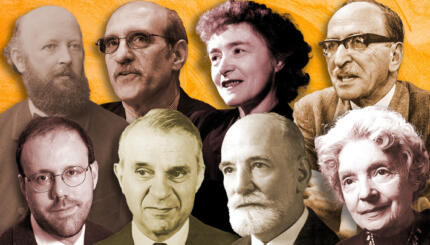After a lengthy gestation period, the Israeli film emerged from its womb in the 1990s, moving into a period of remarkable artistic growth and international legitimacy.
Whereas once the idea of the Israeli film had been associated with third-rate dramas and sophomoric comedies, the emergence of young filmmakers like Eytan Fox, Dover Kosashvili, Shemi Zarhin, and Eran Riklis, along with the continued success of Israel’s most prominent director, Amos Gitai, meant that cinematically speaking, Israel was a cultural backwater no longer.
READ: 6 Israeli Shows to Binge-Watch Now
Amos Gitai
Gitai, who had first come to prominence in 1982 with Field Diary, took center stage in Israeli film in the 1990s while remaining true to his idiosyncratic, ever-varied interests. Gitai’s films alternated between an interest in the way Israelis live now and an in-depth exploration of Israel’s short, tumultuous history. For the former, Gitai sought to avoid the yuppie melodramas favored by filmmakers like Nir Bergman (Broken Wings, 2002) and Savi Gabizon (Nina’s Tragedies, 2003), turning his eye to heretofore ignored subgroups like the residents of Jerusalem’s Mea She’arim district in Kadosh (1999), and the Sephardic working class of Tel Aviv in Alila (2003).
With your help, My Jewish Learning can provide endless opportunities for learning, connection and discovery.
READ: Israel’s Impressive Losing Record at the Oscars
At the same time, Gitai turned back the pages of Israeli history to such national turning points as the Yom Kippur War in Kippur (2000) and the 1948 War of Independence in Kedma (2002), seeking to invest the past with the immediacy of the present. Kippur, possibly Gitai’s masterpiece, was a deeply unusual war film, one more attuned to the confusion of war, and its dispersal of peacetime pursuits, than the traditional combat movie. Never content to make the same film twice, Gitai was condemned to a career of uneven peaks and valleys. While Kippur was considered one of the best Israeli films of the era, Kedma, Alila (2003), and 2005’s Free Zone (co-starring Natalie Portman) all received less-than-stellar reviews. Nonetheless, Gitai remained the don of Israeli directors, his restless artistry an inspiration to a generation of younger filmmakers.
New Filmmakers
In the late 1990s and the beginning of the millennium, a new generation of Israeli filmmakers moved to the fore. These filmmakers were more sophisticated, more polished, and better trained than their predecessors, and their influence spread throughout the Israeli film industry, which suddenly found itself the subject of considerable international interest.
Under the influence of directors like Fox, Kosashvili, and Keren Yedaya, Israeli film concerned itself seriously, for the first time, with the nuances of the country’s diverse, ramshackle society. There were films about the lives of Georgian thirty-somethings looking to escape from the stifling wing of parental authority (Kosashvili’s Late Marriage, 2001), Sephardic teens bowed under the burden of familial responsibility (Shemi Zarhin’s Bonjour Monsieur Shlomi, 2003), a working-class mother and daughter forced to turn to prostitution as a last-ditch response to impending poverty (Yedaya’s Cannes prize-winner Or, 2005), and middle-class families struggling with loss (Nir Bergman’s Israeli Oscar-winning Broken Wings, and Savi Gabizon’s Nina’s Tragedies). There were Yemenites (Bonjour Monsieur Shlomi), Russians (Yana’s Friends, 1999), Christian Africans (James’ Journey to Jerusalem, 2003), Israeli Arabs (The Milky Way, 1997), and the ultra-Orthodox (Ushpizin, 2005).
An Aversion to Politics?
What these films generally avoided, however, was the most dramatic, most all-encompassing aspect of Israeli life from the early 1990s forward: the Israeli-Palestinian conflict and the abortive Oslo peace process. “Palestinian” was a word rarely heard in Israeli film, with most top-flight Israeli films concerning themselves with internal housekeeping rather than matters of diplomacy.
READ: Hollywood Gets Hot for Israel
Instead, narrative filmmakers left the Israeli-Palestinian conflict to documentarians, who took up the reins with aplomb. In films like Yoav Shamir’s Checkpoint (2003) and Avi Mograbi’s How I Learned to Overcome My Fear and Love Arik Sharon (1997) and Avenge But One of My Two Eyes (2005), Israeli filmmakers wrestled with the moral complexities of occupation and endless conflict. Best of all was David Ofek’s haunting No. 17 (2003), which sought the identity of the mysterious seventeenth victim of a Tel Aviv suicide bombing, finding in one lost soul a key that unlocked a world of loneliness, suffering, and solitude buried at the heart of Israeli life, made only more unreachable by violent death. The current conflict was not the only subject of interest to Israeli documentarians, of course; films like Nitzan Giladi’s In Satmar Custody (2003), Yaron Zilberman’s Watermarks (2005), and Dani Menkin’s 39 Pounds of Love (2006) investigated the lives of Satmar Hasidim, a Viennese women’s swim team from the 1930s, and a courageous survivor of muscular dystrophy.
New Themes and Styles
Even taking into account their political hesitancy, it was the narrative filmmakers, though, who contributed the bulk of the exciting new films emerging from Israel. Young Israeli filmmakers adapted freely from European and American film technique while retaining a uniquely Israeli perspective. Among the younger set, Eytan Fox staked out ground for himself as one of the few narrative directors interested in depicting that most central of Israeli institutions: the military. In both Yossi & Jagger (2002) and Walk on Water (2004), Fox set his story among soldiers, torn between duty and desire. Groundbreaking for his depictions of gay eroticism (a major taboo in conservative Israeli society), Fox managed to use his films’ risqué sexuality as a cover for their stinging critiques of Israeli militarism.
Keren Yedaya, who won the Camera d’Or for best first film at the 2003 Cannes Film Festival for Or, was more concerned with women than men, and the lives of Israelis far removed from the elite units of the military. Yedaya’s technique owes a great deal to auteurs like Michelangelo Antonioni and Tsai Ming-liang, with Or’s rigid framing and deliberate lack of camera movement harbingers of a more austere, spartan style than had previously been utilized by Israeli filmmakers. Or’s innovative style was matched by its interest in the forgotten members of Israeli society, those who slip through the cracks. Yedaya was interested in the travails–and traumas–of women burdened with the weight of the world.
Georgian immigrant Dover Kosashvili was similarly interested in the unfamiliar lives of Israelis who did not fit the middle-class Ashkenazic stereotype. His Late Marriage documented some of the mystifying customs of the closely huddled Georgian community in Israel. Late Marriage was a well-wrought tale of tradition colliding with desire, but instead of demonizing the former, as most American films might have, Kosashvili honors Georgian Jewish custom while simultaneously reflecting its stultifying airlessness. Late Marriage thrives on ambiguity: Is protagonist Zaza’s marriage to a woman selected by his parents a blessed commingling of desire between the older generation and the younger, or a callow, cowardly act of kowtowing to authority? Kosashvili does not tell us, and his coyness helped make Late Marriage one of the best films to emerge from Israel in recent memory.
Along with Kosashvili, Yedaya, and Fox, the other major filmmakers of the past 15 years were veterans Shemi Zarhin and Eran Riklis and newcomer Joseph Cedar. Cedar, an NYU-educated American immigrant, made Hollywood-esque thrillers flavored with an impressive knowledge of Israeli cultural history, especially of the religious type. Religious Zionist messianists figure centrally in his Israeli Academy Award-winning Time of Favor (2000), and the settler movement is similarly featured in Campfire (2004). Riklis’ career betrayed a wide-ranging interest in storytelling, from the musical biopic Zohar (1993) to the bittersweet Lebanon war drama Cup Final (1991) to the eye-opening depiction of Israeli Arab life along the Syrian border in The Syrian Bride (2004). Zarhin’s Bonjour Monsieur Shlomi was a tender evocation of teenage anomie, its insight benefiting from its careful analysis of working-class Sephardic life.
In the past fifteen years, Israeli film has grown into its own skin, finding its unique subject matter, style, and mise-en-scene. During that time, Israel has become a world center of filmmaking, with one of the most vibrant groups of young filmmakers of any country. For Israeli filmmakers, though, the burning affairs of domestic life, and the ever-looming Israeli-Palestinian conflict, are too immediate for distraction and mindless entertainment to rule the day. Israelis look to films for a chance to wrestle with their country’s demons, and this seeming limitation of Israeli film has become, in the end, its salvation.
Sephardic
Pronounced: seh-FAR-dik, Origin: Hebrew, describing Jews descending from the Jews of Spain.
Yom Kippur
Pronounced: yohm KIPP-er, also yohm kee-PORE, Origin: Hebrew, The Day of Atonement, the holiest day on the Jewish calendar and, with Rosh Hashanah, one of the High Holidays.



